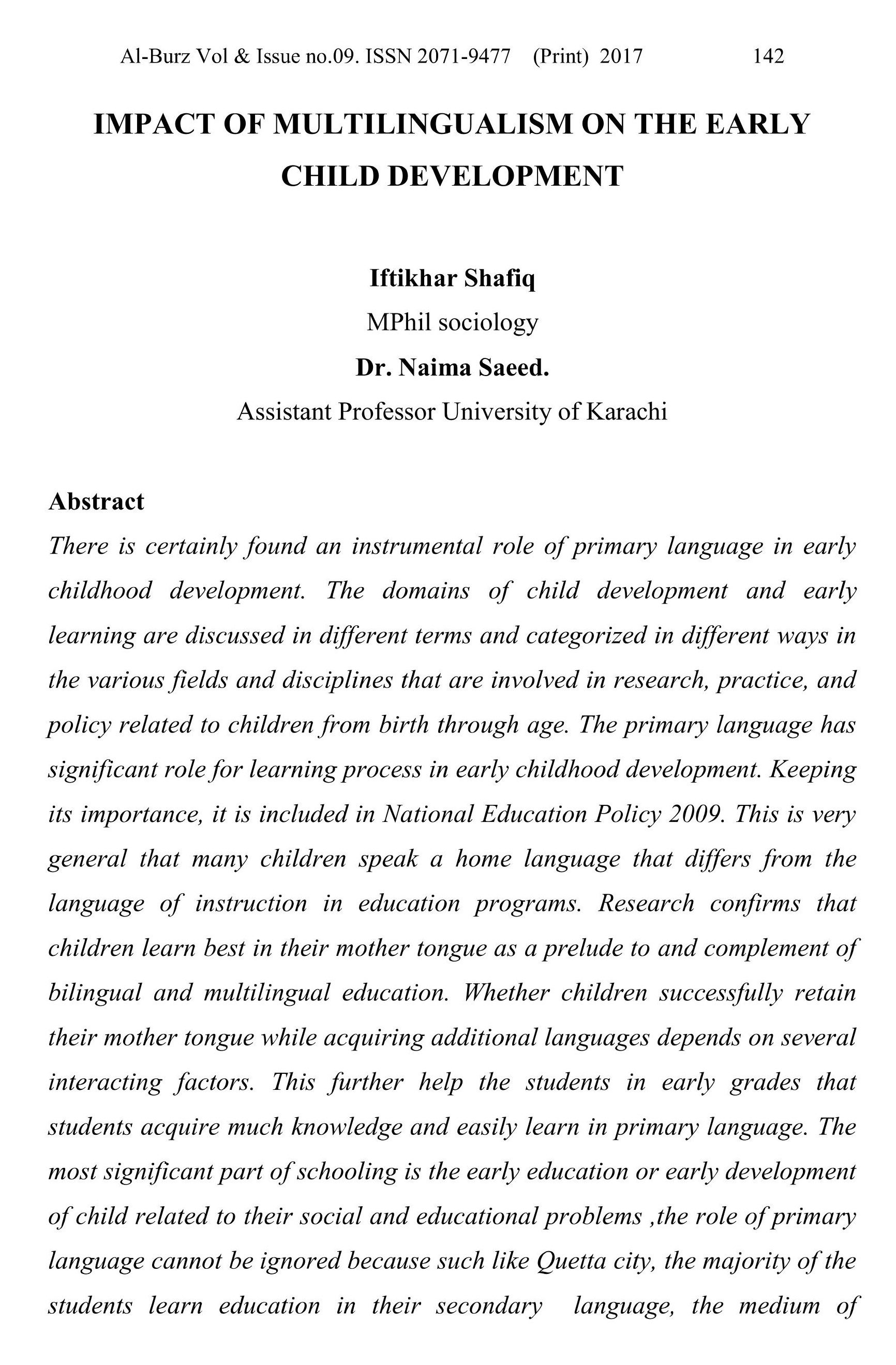IMPACT OF MULTILINGUALISM ON THE EARLY CHILD DEVELOPMENT
DOI:
https://doi.org/10.54781/abz.v9i1.108Keywords:
Child Development, Primary Language, Policy, Practice, Bilingual, Multilingualism, Mod of Instruction.Abstract
There is certainly found an instrumental role of primary language in early childhood development. The domains of child development and early learning are discussed in different terms and categorized in different ways in the various fields and disciplines that are involved in research, practice, and policy related to children from birth through age. The primary language has significant role for learning process in early childhood development. Keeping its importance, it is included in National Education Policy 2009. This is very general that many children speak a home language that differs from the language of instruction in education programs. Research confirms that children learn best in their mother tongue as a prelude to and complement of bilingual and multilingual education. Whether children successfully retain their mother tongue while acquiring additional languages depends on several interacting factors. This further help the students in early grades that students acquire much knowledge and easily learn in primary language. The most significant part of schooling is the early education or early development of child related to their social and educational problems ,the role of primary language cannot be ignored because such like Quetta city, the majority of the students learn education in their secondary language, the medium of instruction in private schools is mostly English and Urdu but in public school the Urdu is used commonly. However the large number of population lives in Quetta they speak their first language as Pashto, Balochi, Brahui, and Hazargi, but less number of students speak Urdu as first or primary language, not only in Quetta but also in all over the province the education system is not good enough to provide quality education to the students, the public and private schools are providing education in province but all of them lack the services
References
Mustard, J. F. (2007). Experience-based brain development: Scientific underpinnings of the importance of early child development in a global world. Early child development: from measurement to action. Washington DC, The World Bank, 43-86.Haque, A. R. (1982). The position and status of English in Pakistan. World Englishes, 2(1), 6-9.
Landau, B., Smith, L. B., & Jones, S. S. (1988). The importance of shape in early lexical learning. Cognitive development, 3(3), 299-321.Ghayur, S., &Burki, A. A. (1992). Combating Unemployment in Pakistan [with Comments]. The Pakistan Development Review, 31(4), 1255-1266.
Hathaway, R. M. (2005). Education Reform in Pakistan: Building for the Future. Woodrow Wilson International Center for Scholars. One Woodrow Wilson Plaza, 1300 Pennsylvania Avenue NW, Washington, DC 20004-3027.
Gupta, A. F. (1997). When mother-tongue education is not preferred. Journal of Multilingual and Multicultural Development, 18(6), 496-506.
Bamgbose, A. (1984). Mother-tongue medium and scholastic attainment in Nigeria. Prospects, 14(1), 87-93.
Bamgbose, A. (1976). Mother Tongue Education: The West African Experience.
Knox, A. (1992). Influences on career choice: the responses of ethnic-minority and ethnic-majority girls. British Journal of Guidance & Counselling, 20(2), 193-204.
Siann, G., Knox, A., Thornley, E., & Evans, R. (1990). Parents, careers and culture: the view of ethnic-minority and ethnic-majority girls. British Journal of Guidance & Counselling, 18(2), 156-169.
Falaye, F. W., & Adams, B. T. (2008). An assessment of factors influencing career decisions of in-school youths. Pakistan Journal of social sciences, 5(3), 222-225.
Hue, M. T. (2010). The challenges of making school guidance culturally responsive: Narratives of pastoral needs of ethnic minority students in Hong Kong secondary schools. Educational Studies, 36(4), 357-369.
Soliman, A. M. (1991). The role of counseling in developing countries. International Journal for the Advancement of Counselling, 14(1), 3-14.

Downloads
Published
How to Cite
Issue
Section
License
Copyright (c) 2017 Authors who publish with Al-Burz journal agree to the following terms: 1. Authors retain copyright and grant the journal right of first publication with the work simultaneously licensed under a Creative Commons Attribution (CC-BY) License that allows others to share the work with an acknowledgement of the work's authorship and initial publication in this journal. 2. Authors are able to enter into separate, additional contractual arrangements for the nonexclusive distribution of the journal's published version of the work (e.g., post it to an institutional repository or publish it in a book), with an acknowledgement of its initial publication in this journal.

This work is licensed under a Creative Commons Attribution-NonCommercial-ShareAlike 4.0 International License.
Alburz has licensed under a CC Attribution-NonCommercial-ShareAlike 4.0



